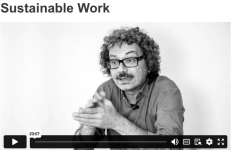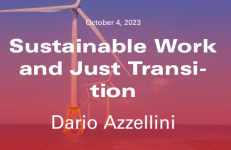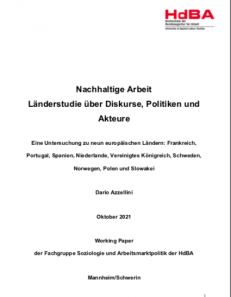Transición Justa
Video talk based on the article: Optimizing or Abolishing Capitalism? Sustainable Work and Just Transition Rather than Labor Society and Climate Catastrophe
Sustainable Work

Workers of all stripes and their communities potentially have an existential interest in sustainable, non-polluting production. And they are also the ones who will bear the brunt of a social-ecological transformation. Therefore, if workers do not take a central role in defining and practicing the transformation, it will not happen, as the social scientist Dario Azzellini argues in his “Allied Grounds” video talk.
Policies and labour movement actors in France, the United Kingdom, Germany, Norway, Spain, Poland, Colombia, Mexico and the Philippines
Sustainable Work and Just Transition

Sustainable Work and Just Transition
Policies and labour movement actors in France, the United Kingdom, Germany, Norway, Spain, Poland, Colombia, Mexico and the Philippines
Dario Azzellini, Sebastian Brandl und Ingo Matuschek
Nationale Perspektiven auf Nachhaltige Arbeit und Inwertsetzungen von Arbeit in Europa
Azzellini, Dario; Brandl, Sebastian; Matuschek, Ingo. 2023. “Nationale Perspektiven auf Nachhaltige Arbeit und Inwertsetzungen von Arbeit in Europa.” Barth, Thomas; Jaeger-Erben, Melanie; Jochum, Georg; Lorenz, Stephan (Eds.). Nachhaltig Werte schaffen? Arbeit und Technik in der sozial-ökologischen Transformation. Series “Arbeitsgesellschaft im Wandel.“ Weinheim: Beltz / Juventa. 100-116.
Eine Untersuchung zu neun europäischen Ländern: Frankreich, Portugal, Spanien, Niederlande, Vereinigtes Königreich, Schweden, Norwegen, Polen und Slowakei
Nachhaltige Arbeit Länderstudie über Diskurse, Politiken und Akteure

Abstract: Nachhaltige Entwicklung ist politisches Ziel der EU und ihrer Mitgliedsstaaten. CO2-Reduktion, Energie- und Mobilitätswende sind tagesaktuell. Spätestens zum Jahr 2050 soll in Europa die Treibhausgasneutralität erreicht werden, bereits bis zum Jahr 2030 soll die Bundesverwaltung in Deutschland klimaneutral sein. Nicht nur Produktion und Konsum werden sich dadurch massiv verändern, sondern auch die Erwerbsarbeit und die Arbeitsmärkte.
























